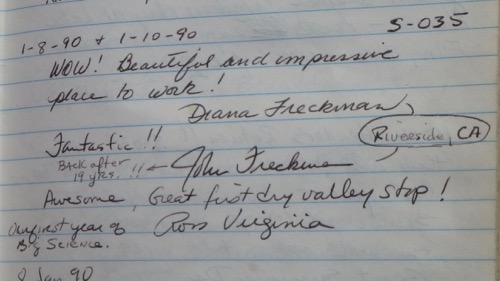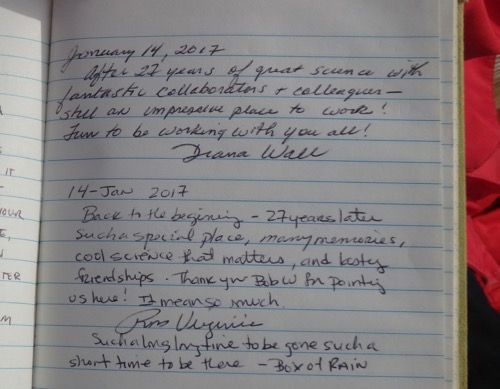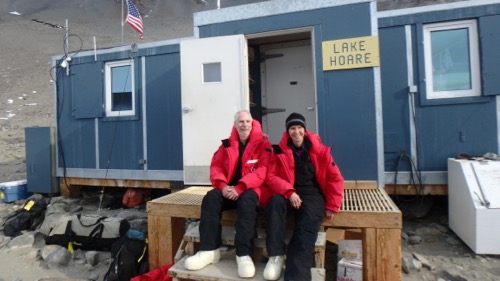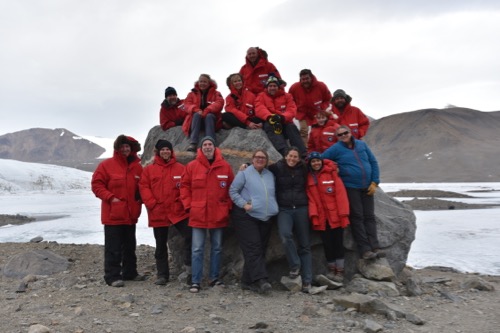"Our First Year of Big Science" Ross Virginia wrote in the Lake Hoare camp log book in January 1990. 27 years later and it can definitively be said that Ross Virginia and Diana Wall have indeed done some "big science". It all started with a nalgene bottle full of soil from the Dry Valleys. Bob Wharton had collected the soil sample in Taylor Valley and sent it to Diana Wall for analysis. After finding nematodes in the sample, she and Ross Virginia put together a proposal to do more extensive surveys for nematodes in Dry Valley soils. Their hope was to parse out the impact of soil structure and chemistry on the distribution and composition of animal communities without having to deal with confounding variables like plants and higher animals. Nearly three decades of work along those lines has placed the soil team in an ideal position to answer big questions on how Dry Valley soil communities respond to climate change. This work also provides a foundation for models and predictions of how other soil ecosystems with greater biodiversity and complexity will respond.


Goodbye for Now
Diana and Ross left the ice on January 19th. Both Diana and Ross have plans to continue research in Antarctica but they are stepping down from their roles as principal investigators for the soil team of the McMurdo Dry Valleys LTER. I sat down with them before they left to talk with them about their research. I would like to share a few things that stood out to me from our conversation.

Best Part of Antarctic Research
I asked the two of them what they liked most about Antarctic research and without hesitation the response was "the people". Diana commented on how stimulating it is to work in an environment with a strong collaborative spirit. This is a place where colleagues can meet during a short intense field season and be totally immersed in the experience. This is fertile ground for the exchange of ideas. Ross added that it is very rewarding to work with students that come to Antarctica for the first time filled with wonder and awe. He likes how the experience becomes a strong motivation for a student's own research career.

Long-term Research
Their comments on the importance of long-term ecological research centered around the variability of natural systems and the need to monitor a system for a long time to detect a trend. A short-term study may give you a snapshot that is the opposite of what the actual long-term trend is. In Dry Valley ecosystems they have learned from experience that an experimental manipulation may not result in a detectable change for five or more years. They like the National Science Foundation's Long-Term Ecological Research (LTER) approach because it emphasizes long-term monitoring and it brings scientists together from many disciplines and allows for a big picture to emerge from that collaboration.
Advice for Students
"Science is fun. It's the best job in the world!" Diana exclaimed. They are both passionate about their research and their success likely stems from their love for what they do. Ross's advice for science students, "If you're interested in science, do science!". They emphasized how their own trajectories in their science careers had not been linear. Serendipity played a role, but being successful is also about getting involved. They suggested finding a mentor or getting involved at a local museum. Study something you are interested in and then network and collaborate to broaden the impact of your research.
Advice for Teachers
I asked what they thought the most important things science teachers could teach and they came up with two ideas: 1. Teach students to ask questions that are testable. They emphasized the importance of using scientific thinking as a way to understand the world and enrich your life. Learning to ask testable questions is beneficial to everyone. 2. Foster curiosity. They emphasized the importance of helping students be curious about the world. Curiosity will lead to a more fulfilling life experience.
My Experience
I am glad for the opportunity I had to work with Ross Virginia and Diana Wall. It was fun to watch the two of them work together. The many years of collaboration between them has made them a powerful team. I found them both to be gracious. They made me feel welcome as a new wormherder. Ross would consistently ask how my blog was going and would readily offer compliments. He was always willing to take time to explain things such as the formation of polygons on the landscape. I enjoyed his soft-spoken easy-going manner. Diana was patient as I learned new field techniques. She seemed to always be looking out for my well-being. As an example, last week she pointed out a rare fresh tomato-salad that I almost passed up in the galley. It was fun to listen to her talk about nematodes and watch her come into the lab beaming after we had extracted Scottnema from the first samples we processed. She even performed a nematode dance. Thank you Diana and Ross for everything.


Comments